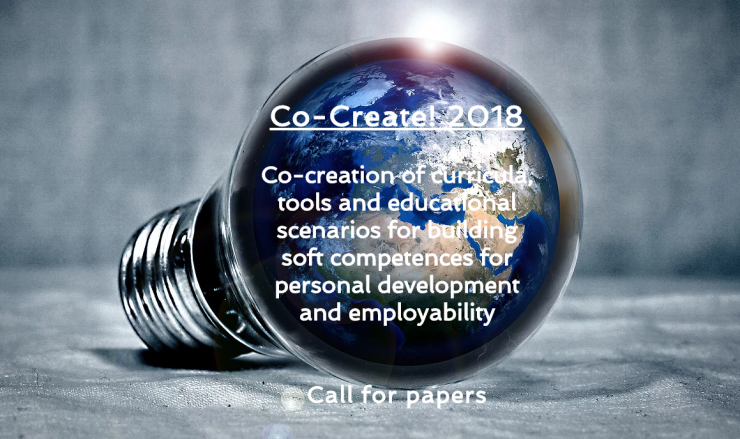Co-creation of curricula, tools and educational scenarios for building soft competences for personal development and employability
Science Centre AHHAA in Tartu, Estonia, 17-19 September 2018
The conference “Co-Create!” aims at presenting case studies, experiences and theoretical reflections related to the need of adopting participatory processes engaging schools, scientists and other societal actors as co-producers of curricula and educational scenarios. The conference is built around the organizers’ experiences within Erasmus Plus projects, in particular, DIYPES – Do It Yourself! A participative approach to increase participation and engagement of high school students in Physical Education and Sport classes. DIYPES final aim is to develop scenarios and examples of good practice in regards to models for building innovative participatory approaches to Physical Education and Sport classes at a European level. Participation and involvement of other international projects, in particular, Erasmus Plus projects with educational purposes, is welcomed in order to get a broad exchange of views (among them, for instance, DESCI – Developing and Evaluating Skills for Creativity and Innovation, aimed at promoting alternating training paths based on the Living Lab approach, adopting participatory design methodologies to connect school, enterprise, research and territory).
The development of educational curricula, scenarios and tools like textbooks is not a “neutral” matter, but one that reflects the assimilation of specific values by societies, and the view of how societies are building their future; this is the reason why actively involving different actors from the educational field can be considered as a political action in the perspective of “aligning research and innovation to the values, needs and expectations of society” and integrating citizens’ visions, needs and desires into science and innovation, as envisaged by the Responsible Research and Innovation (RRI) framework. In particular, in the last years debate on competences, the role of soft skills – which, according to the EU Commission, include Learning to learn, sense of initiative and entrepreneurship, social skills and problem solving – is increasingly emerging in the development of more inclusive societies and in promoting innovation processes in the context of the H2020 societal challenges.
Specific themes of interest for the “Co-Create!” conference include but are not limited to:
-
the use of participatory methodologies/processes in educational and work environments, involving students, teachers and other social actors in co-producing educational scenarios, including alternating training, and innovation;
-
building competencies and skills in educational and work environments: the emerging role of “soft” skills – also related to social interaction, commitment to active and democratic participation, creativity, ability to plan and manage projects in order to achieve objectives – as the cornerstone for the personal development of individuals, in close connection with the “hard” subject-related skills, also to foster youth employment;
-
multiculturalism as transversal value to be considered in educational and work environments, in a historical period where Europe is confronted with increasing migratory waves;
-
innovative processes for developing educational curricula in relationship to work environments.
The submitted papers are encouraged to debate the specific themes from the perspective of science education, in connection with the other RRI key themes: public engagement, governance, ethics, gender and open science.
With this focus the conference will cover and systematise these themes and will help to fill the gap in the current literature.
Abstract submission
Abstracts related to the conference topics – including theoretical, empirical and methodological reflections, also starting from projects and experiences – are welcome.
Abstracts should be sent by April 25, 2018, to the following e-mail addresses:
adriana.valente@cnr.it, petru.sandu@publichealth.ro, valentina.tudisca@irpps.cnr.it.
The submitted abstracts should not exceed 150 words.
For more information please click HERE.

